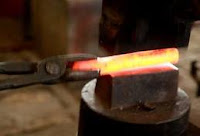hadith-hadith regarding this issue, include the following :
First: It was narrated from
Ibn `Abbas, from the Prophet. said:
"Therapeutic treatment there
are three ways, namely; Cupping(hijama), drink honey
and kay (pressed a hot iron on the injured area), and I forbid my ummah treatment
with kay. (Bukhari, no: 5680).
Second: Narrated Jabir bin Abdullah
ra, he said,
"I heard the Messenger of Allah. said:
"If there is good in
the treatment of you do, then the goodness is in Cupping(hijama), drink honey and the sting of hot
fire (by putting a
hot iron therapy in a wound) and I do not like kay" (Bukhari, no:
5704 and Muslim
, no: 2205).
Third: Narrated Jabir bin Abdullah
ra, that he said:
"Sa'd bin Mu'adh ever had shooting
arrows in his
veins, and then dissect
them with spears Prophet heated by fire, after
which the wound swells, then dibedahnya again"
(Muslim)
Fourth: From Jabir bin Abdullah ra, that he said:
Fourth: From Jabir bin Abdullah ra, that he said:
Verily the Messenger of Allah,
had sent a physician to Ubayy ibn Ka'b.
The physician then
dissected grain and
burned him with al kay (hot metal) "(Reported
by Muslim, no: 4088)
The scholars said that the actual hadith-hadith above prohibition does not indicate treatment with alkay (hot iron) but only showed poor, if any other drugs, or because in al kay containing torture against him. (Salim bin 'Eid al-Hilali, Encyclopedia ban according to the Qur'an and Sunnah, Imam Shafi'i Library, 2006, 3/202-204.)
The scholars said that the actual hadith-hadith above prohibition does not indicate treatment with alkay (hot iron) but only showed poor, if any other drugs, or because in al kay containing torture against him. (Salim bin 'Eid al-Hilali, Encyclopedia ban according to the Qur'an and Sunnah, Imam Shafi'i Library, 2006, 3/202-204.)
Mother Hajar al-Hafidh said: "The
conclusion of the merger (hadith-hadith
above) that the Messenger
of Allah actions demonstrated
ability (using the al-kay), while he left
her, and praised those who
leave, it is not showing
the ban, but it just
shows that the left it is better than using it.
reason
he forbids
using al kay,
probably applied if there is another option, and only be makruh. Or
in diseases that are incurable by other means. Allaah knows best "(Fathul
Bari, Cairo, Dar
ar Royan, 1987 M:
10/164)
Ibn Hajar's words above strengthened by
Ibn Qayyim, he wrote: "Hadith al-Kay
above contains four things:
first, that the Messenger of Allah
used al-Kay,
the second: he did not like the third one: praise people
who can left, fourth: his restrictions against
the use of al-Kay.
Fourth it is not opposed
to each other-praise be to God.
matters he uses al Kay shows can be done, while he showed displeasure ban,
Now these her praise
to the left shows
that leave treatment
with al Kay is better, while his ban
happened if there was another option, or meaning makruh or use it
for things that are not needed, such as fear of a
disease in itself occurred. "(Zaad
al Ma'ad, Beirut,
Muassasah al fliers,:
4/65 to 66)
Is Kay deny al Treatment
Tawakal sense?
Narrated by al-Mughirah bin Syu'bah ra, from the Prophet. he said:
Narrated by al-Mughirah bin Syu'bah ra, from the Prophet. he said:
"Whoever did treatment with kay way
or ask for ruqyah
mean he did not put
their trust," (Saheeh, HR
at-Tirmidhi, no: 2055
and Ibn Majah,
no: 3489).
Some people, either in understanding the above hadith and stated that treatment with al kay is haraam, because it denies a sense of resignation to God Almighty.
Ibn Qutaibah have answered the above and al Kay explained that there are two forms:
Some people, either in understanding the above hadith and stated that treatment with al kay is haraam, because it denies a sense of resignation to God Almighty.
Ibn Qutaibah have answered the above and al Kay explained that there are two forms:
The
first form: is al Kay for healthy people,
so as not to get sick, as was done by the
people of al 'Ajam (non-Arabs), they often
treat children and young people by their method of al Kay, whereas they are in good health. They assume that such an event could maintain their
health and stay away from various diseases. So
did the Arabs during the Jahiliyyah follow that
way, they even apply their camels in
the event of an outbreak of
disease. This form al Kay prohibited
by the Prophet as denying resignation to
Allah swt. Because it assumes
that by leaning to the fire, they will not get sick.
Second Two: is treatment
with the method of al Kay if anyone was injured in one limb, or bleeding extraordinary
and similar matters. Al Kay like this that has the potential to be able to heal,
with the permission of Allah. Because the Prophet himself never treat by As'ad ibn
al Kay on his neck Zurarah (Tirmidhi). (See ta'wil Mukhtalafal al Hadith, 329)

No comments:
Post a Comment